
Rather than give the former workers all their entitlements – severance pay and gratuity, among others – the bank enforced an agreement on them that they could only collect one of the entitlements at a time.
The seeming arrogance and impudence of the financial heavyweight signpost the serious allegations many of its former staff are levelling against it. It all started in 2012.
A reliable source, who is also an ex-employee that resigned on December 31, 2012, said the bank caused the majority of them to resign their appointment against their wish by ignoring their opinions and feelings while hundreds of people were sacked and their appointments terminated by a letter through the former Head, Employee Relations, Anthonia Opara and Mrs. Bolaji Agbede, Head, Group Human Resources which the proof, a clear document is with SaharaReporters.
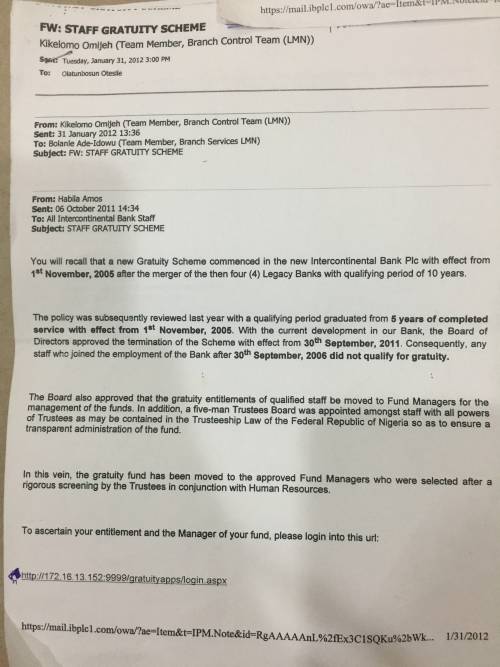
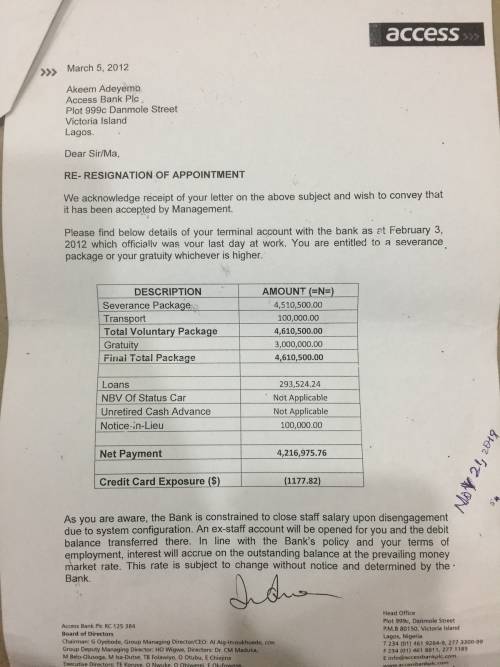
According to a document forwarded by the Team Member, Branch Control Team (LMN), Kikelomo Omijeh on Tuesday, January 31, 2012 at exactly 3:00 PM to one Olatunbosun Otesile, Team Member, Branch Services (LMN) containing the Staff Gratuity Scheme says that Intercontinental bank has reviewed its old gratuity scheme for qualifying for the money from 10 years to 5 years with immediate effect from 1st of November, 2005.
However, the document also stated that the staff that joined the bank after 30th September 2006 will not qualify for gratuity but those that have worked before that year will be paid. In this gratuity scheme, an example of N2, 500,000 was used in demonstrating how the Gratuity fund is stipulated and verified by the bank to be paid.
In 2012 when the merger between Intercontinental bank and Access bank was about to take place, according to a reliable source, the management of the bank had a meeting with the staff asking them to resign because there will be no place to secure a job in the bank if the merger comes through.
Many of the employees agreed to resign since the bank had promised to pay their severance and gratuity packages.
When an employee is leaving, the gratuity and the severance package should be paid.
SaharaReporters found out that the calculation of how much the former employees would receive was not clear.
With many of its staff agreeing to resign, the bank realized it would suffer a huge indebtedness and according to reliable sources, Access Bank decided to play a fast one on its once loyal workers who had chosen to resign their appointment with the bank. Rather than give the former workers all their entitlements – severance pay and gratuity, among others – the bank enforced an agreement on them that they could only collect one of the entitlements at a time.
For example, a document attached to the resignation letter by Access Bank to one Adeyemo Akeem Adewale (Staff No: 020030)and dated March 5, 2012, said: “We acknowledge receipt of your letter on the above subject and wish to convey that it has been accepted by Management. Please find below details of your terminal account with the bank as of February 3, 2012, which officially was your last day at work. You are entitled to a severance package or your gratuity whichever is higher.”
Some of the former employees who complained about their gratuity were the former staff of Intercontinental Bank Plc which was acquired by Access Bank. They were considered eligible to receive gratuity under the defunct Intercontinental Bank’s gratuity scheme managed by Crusader Sterling Limited.
A source told SaharaReporters that the gratuities which were originally managed by Crusader Sterling Bank, NLPC Pension Administrators Ltd and First Trustees were moved by Access Bank to fund managers (the fund managers so as to tell the staffs that they have already gained access to the money legally without which Intercontinental Bank cannot meddle with. All these are just to shield the beneficiaries from getting their gratuity.
Earlier, in a gratuity document by Intercontinental Bank sent to all its staff on 6th of October 2011 prior to the merger, in the third paragraph wrote: “The board also approved that the gratuity entitlements of qualified staff should be moved to Fund Managers for the funds. In addition, a five-man Trustees Board was appointed amongst staff with all powers of Trustees as may be contained in the Trusteeship Law of the Federal Republic of Nigeria so as to ensure a transparent administration”
“In this vein, the gratuity fund has been moved to the approved Fund Managers who were selected after rigorous screening by the Trustees in conjunction with Human Resources,” a source said.
In a document obtained by SaharaReporters of the deed of appointment of Trustees for the Gratuity scheme, Mrs. Vesiri Olu-Odugbemi, Mrs. Hetty Dambo, Mr. Akeem Babatunde, Mr. Mike Leramo and Mr. Dapo Tijani all signed on behalf of members of the scheme in the presence of Habila Amos who was at that time the Head of Human Resources of Intercontinental Bank PLC.
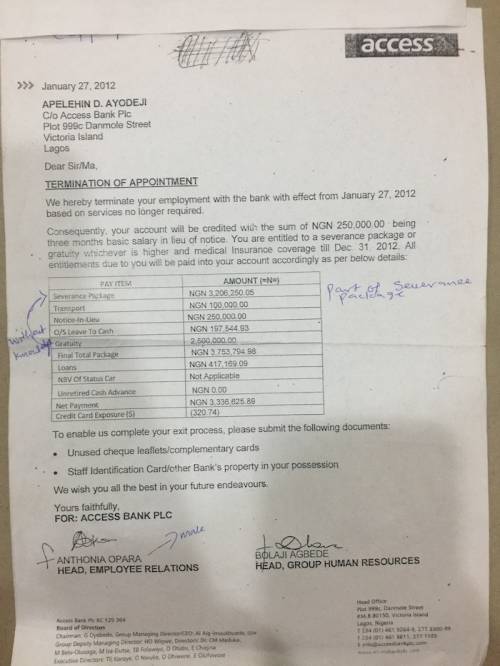
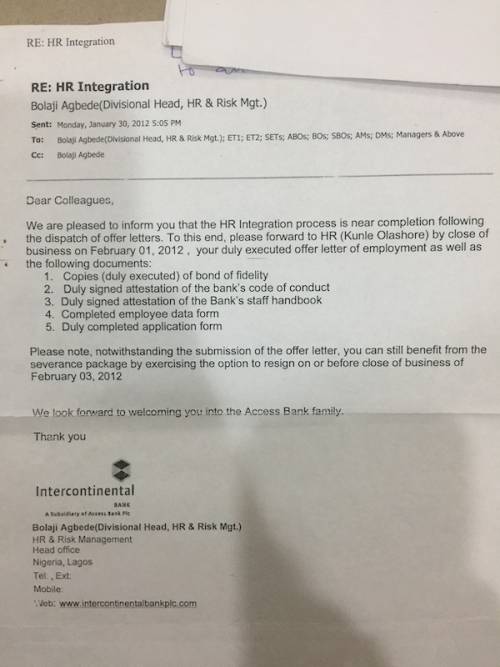
“In order to manage the scheme, the Company is desirous of appointed the staff as Trustees of the scheme” stated clearly on the second page of the ‘b’ part of the document.
This means the bank actually appointed them to be the intermediary between the fund managers where the bank had moved the gratuity fund with and the staff members so as to not allow any means of fraudulence.
It was done when the Central Bank of Nigeria was planning to sell Inter-continental bank to Access and the staff are afraid that they will be sacked without payment or see anything to benefit in.
As a consequence, some of the staff now reasoned along with the bank’s guidelines that since they were already qualified for the gratuity, they could resign.
Knowing too well about the numbers of the staff that want to leave, which means there will not be any buyers. With that, they assured them that their money will be safe and this brought to the movement of funds from the bank to the five funds managers as explained earlier.
Since this money has been in their care (Access Bank) and no successor is allowed to tamper with the money, in a cunning way, “Operation Just Cause” OJC was introduced just to make sure that they frustrate the staff and give reasons to sack some who will not be able to meet the target;
“What they did was that they gave every staff regardless of your grade of deposit target to go and source fund for the bank, targets that were outrageous. They gave us a target of a deposit and reactivation of dormant accounts. We complained and of course, there is nothing we could do.
Access Bank management do it in a way that if we bring in new deposit and at the end of the day, the owner should not take out from that deposit for three months, if they withdraw any amount, that shows that we going to get a negative mark and all our labour will go in vain.”
Some of the staff not sacked, knowing too well that there might be a calamity that would befall them, resigned because of the management's earlier said all their allowance will be paid.
“If we had known that our gratuity will not be paid to us as promised earlier giving us the option of resigning, some of us wouldn’t have resigned, at least work more and gather money till we are sacked,” said a source.
“Access Bank met with the fund’s manager in which our money has been successfully kept by Intercontinental Bank to release the gratuity to them. This money is part of the money the bank used to pay our severance package.
“Without the gratuity payment, this indicates that all our years of labour and working honestly with our former employers are just in vain which Access Bank management took away with impunity” lamented by an ex-staff.
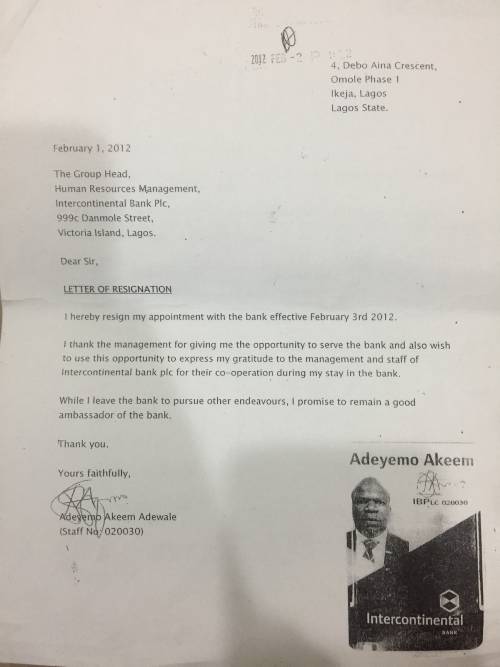
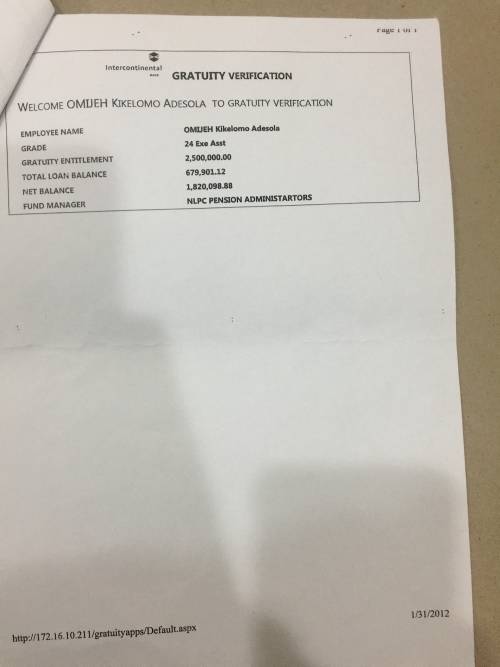
One of the top officials in Access bank told SaharaReporters that the amount of money which the bank use abnormality and fraudulence to filter away both sacked or retired staff are more than N6 billion naira.
Some of the staff took the case to court with their intact document as a piece of evidence to tender. This is after they’ve met with the Bola Akinyele and Co Chamber to seek for their opinion on the issue which the legal practitioners wrote to the Managing Director of Access Bank on May 2, 2012, soliciting for the staff who formally resigned.
In the document, the chamber noted that if the terms were not met within 14 days from the receipt of the letter that the staff had the right to set in motion the legal machinery at the appropriate court to redress, remedy and vindicate the ex-workers legal rights.
When the staff noticed that the response from Access Bank’s management was not satisfactory, they proceeded to court.
First, it was the National Industrial Court of Nigeria on February 4, 2013. The case was initially assigned to Justice Obaseki-Osaghae.
During the case, an ex-staff said: “The first three preceding, their lawyer(s) didn’t show up in the court trying to frustrate us with the case, he continued that The judge, Obaseki-Osaghae now wrote to the bank that if they fail to produce their lawyer(s) she will preside over the case. So before the next case, some people have informed the management of the bank what is going on.
I was told that they perform their magic. Before the next case, Justice Obaseki-Osaghae was transferred to the Calabar Division of the National Court.”
SaharaReporters gathered that the regulatory bodies who contacted Access Bank to appear before them were immediately compromised before the next court proceeding and the case dropped after. This shows that the case was transferred to another judge.
“Following the transfer of Obaseki-Osaghae, the matter was assigned to Justice J.D. Peter. He came up only on five occasions before the said Honourable Justice dismissed the case. So, the court now brought another judge that is in the interest of the bank. To tell you that there was compromised about the case, one of the heads of the Industrial courts was indicted. “
“The judge granted a relief that the defendants never even apply for. But our case and stand with the bank was that they have no right to tamper with our gratuity in the first place and second, there are some of the staff members appointed by the same Access Bank Management to monitor our funds.”
“The duty of the staff is to make sure the money is not tampered with and when they did, we questioned them that how can Access Bank come from the back to gain access to our gratuity package to pay our severance package.”
“What the judge did was striking out those staff (Board of Trustees) that they are not responsible to be with the money that they are just acting on principal as agents on behalf of Access Bank.”
Although the bank appointed some five trustees, the management actually played a trick while preparing the deed document knowing full well that the case might go to court if they eventually withheld the gratuity money of the staff members. What they did was that on page three no 6, 7 and 8 said:
“Upon transfer of the gratuity sum to the Fund Manager, the company (Bank) shall cease to operate the gratuity scheme policy and no member of staff of the company who thereafter attains five years in the service of the company shall be entitled to the scheme”. This actually means that after they had successfully transferred the fund to the fund managers, any members that joined after will not be entitled to gratuity. This is quite explanatory as this not what SaharaReporters want to reveal.
“The trustees shall have the sole exclusive powers to relate directly with the Scheme Manager in relation to the administration and management of the scheme” this is not the interesting part.
The interesting part is number (
 which states that;
which states that;“In the case above mentioned, the Trustees shall incur no liability for so acting and they shall in no way be bound to call for further evidence or be responsible for any loss that may be occasioned by acting on any such certificate and/or statement”
This simply restricted the Trustees to some extent. This shows even if the management of the bank go ahead to meet the fund managers and get some funds without their (staff) consent, the members of the board (Trustees appointed by the same bank just to paint the bank that they are transparent) do not have the right to request for evidence or bank statement.
These are people with passion who before the merger of the banks have worked tirelessly. More so, the bank also said while leaving the employers’ service prior to exit date he or she “shall, in any event, be entitled to the sum due to him in the Scheme (Gratuity)”.
Although, the case is still in court and it has been adjourned until November 21, 2019.
| Posted: at | |



 TRENDING GISTS
TRENDING GISTS  BREAKING: Tragedy As 4 Year Old Boy Dies In Abuja School Amid Suspicion Of Foul Play
BREAKING: Tragedy As 4 Year Old Boy Dies In Abuja School Amid Suspicion Of Foul Play Veteran Journalist, Ray Ekpu Loses Wife To Cold Hands Of Death
Veteran Journalist, Ray Ekpu Loses Wife To Cold Hands Of Death VIDEO: Davido Lists Artistes He Loves To Collaborate With
VIDEO: Davido Lists Artistes He Loves To Collaborate With